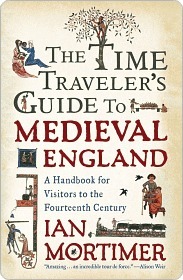More on this book
Community
Kindle Notes & Highlights
by
Ian Mortimer
Read between
January 1 - January 4, 2024
one man murders another on board, the penalty is to tie him to the corpse and fling him into the sea.
Hospitality is considered a work of charity, and listening to a stranger’s news over a mug of ale and a plate of bread and cheese is one of the most pleasant and rewarding forms of charity there is.
With regard to the latter, these are very “public” conveniences. The usual sort of arrangement is three or four wooden seats in a row—sometimes more—with no partitions between them. Sitting down and chatting with your fellow traveler while trying to pass a meat-diet-engorged stool is something you might have difficulty getting used to.
You may associate hospitals with sickness and medicine—and some are exclusively concerned with ill people, especially lepers—but many are for the provision of hospitality (hence the name).
Nothing is wasted in a peasant’s household. Even the plates are edible.
As with everything else which is green, or greenish, these are boiled thoroughly prior to eating. There is a widespread understanding that green vegetables—cabbages in particular—are not good for you, and potentially harmful if raw.
(the inclusion of hops being the difference between ale and beer).
Seals, porpoises, dolphins, barnacle geese, puffins, and beavers are all classed as fish as their lives begin in the sea or in a river. Hence they are eaten gleefully, even on nonmeat days.
Medieval life might be unhealthy, but some medieval medical concepts are unhealthier still. Before long you will think of medieval medicine as a bizarre mixture of arcane ritual, cult religion, domestic invention, and a freakshow
Moralists write diatribes against the practice, castigating the Danes, who are supposed to be so vain that they comb their hair every day and have a bath every week.
The breath of menstruating women can make a wound go bad, and so can the breath of a physician who has recently had sex with a menstruating woman (or so the Nottinghamshire surgeon John of Arderne will tell you, apparently from personal experience).
It reveals the inadequacy of a concept of society based on the “three estates.” Frankly, if “those who pray” cannot protect the population, and “those who fight” simply run away, why should “those who work” feed them?
Take a fat cat, flay it well, and draw out the guts. Take the grease of a hedgehog, the fat of a bear, resins, fenugreek, sage, honeysuckle gum and virgin wax, and crumble this and stuff the cat with it. Then roast the cat and gather the dripping, and anoint the sufferer with it.
There is a widespread tolerance of death by medical misadventure.
A surprisingly large number of indicted men choose to accuse other people of crimes, or of complicity in their own crime. This system is known as “approving.” When a condemned man is brought out of his wooden cell or the common pit, and dragged before the judges who are going to try him, he accuses his enemies by way of “appeal.”
Notwithstanding his death, writs go out to empanel juries to try those he has accused. It is a shocking system. If you are a criminal and you know you are going to die, then why not accuse your enemies of complicity in your crimes when you face the judges? If your enemies are found guilty, they too will hang. Similarly, if you are going to die anyway, and your gaoler promises you that he will treat you better in your last days if you appeal one of his enemies, then what have you got to lose?6
Local justice is designed to find somebody guilty; it does not necessarily follow that that somebody is the person responsible for the crime in question.
Bad justice sometimes arises from those who administer the law.
There are very few checks or balances in this system. Hence there is a great deal of blatant corruption.
Arguably the most corrupt of all the officers involved in local justice are those who act as gaolers. You can tell that things are fundamentally wrong when a statute has to be passed (in 1330) to stop gaolers refusing to accept certain prisoners. It seems they are refusing to imprison criminals who are not rich enough to bribe them.
In 1305 the Scots patriot and outlaw Sir William Wallace undergoes the full drawing, hanging, disemboweling, and quartering, by order of Edward I.
any spectacle from the fourteenth century can be said to be essential viewing, it has to be the joust. Where else, in all history, can you see the richest, most powerful, and most privileged members of society risk injury and death for the sake of your entertainment? Where else in all history can you find rich and powerful men paying for the privilege of breaking their necks and goring one another in public?
As for our modern political leaders, business leaders, and aristocrats, forget it.
As you travel around medieval England you will come across a sport described by some contemporaries as “abominable . . . more common, undignified and worthless than any other game, rarely ending but with some loss, accident or disadvantage to the players themselves.” This is football.


